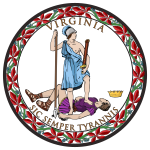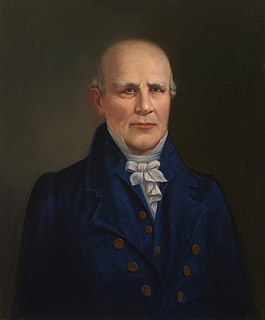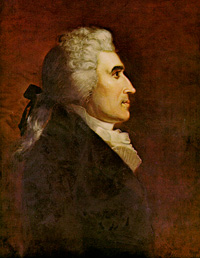| ||||||||||||||||
All 19 Virginia seats to the United States House of Representatives | ||||||||||||||||
|---|---|---|---|---|---|---|---|---|---|---|---|---|---|---|---|---|
| ||||||||||||||||
 Virginia's results by district | ||||||||||||||||
| Elections in Virginia |
|---|
 |
| District | Incumbent | Party | First elected | Result | Candidates |
|---|---|---|---|---|---|
| Virginia 1 | Robert Rutherford | Democratic-Republican | 1793 | Incumbent lost re-election. New member elected. Federalist gain. The election was unsuccessfully challenged by Rutherford. [1] | √ Daniel Morgan (Federalist) [2] Robert Rutherford (Democratic-Republican) |
| Virginia 2 | Andrew Moore | Democratic-Republican | 1789 | Incumbent retired. New member elected. Democratic-Republican hold. | √ David Holmes (Democratic-Republican) 60.4% John Steele (Federalist) 27.5% John Bowyer (Democratic-Republican) 12.1% |
| Virginia 3 | George Jackson | Democratic-Republican | 1795 | Incumbent lost re-election. New member elected. Federalist gain. | √ James Machir (Federalist) 45.4% George Jackson (Democratic-Republican) 28.7% John Mitchell (Democratic-Republican) 20.1% Thomas Wilson (Federalist) 5.7% |
| Virginia 4 | Francis Preston | Democratic-Republican | 1793 | Incumbent retired. New member elected. Democratic-Republican hold. | √ Abram Trigg (Democratic-Republican) [2] |
| Virginia 5 | George Hancock | Federalist | 1793 | Incumbent retired. New member elected. Democratic-Republican gain. | √ John J. Trigg (Democratic-Republican) [2] |
| Virginia 6 | Isaac Coles | Democratic-Republican | 1793 | Incumbent retired. New member elected. Democratic-Republican hold. | √ Matthew Clay (Democratic-Republican) [2] |
| Virginia 7 | Abraham B. Venable | Democratic-Republican | 1790 | Incumbent re-elected. | √ Abraham B. Venable (Democratic-Republican) [2] |
| Virginia 8 | Thomas Claiborne | Democratic-Republican | 1793 | Incumbent re-elected. | √ Thomas Claiborne (Democratic-Republican) 62.3% Jesse Browne (Federalist) 37.7% |
| Virginia 9 | William B. Giles | Democratic-Republican | 1790 | Incumbent re-elected. | √ William B. Giles (Democratic-Republican) [2] |
| Virginia 10 | Carter B. Harrison | Democratic-Republican | 1793 | Incumbent re-elected. | √ Carter B. Harrison (Democratic-Republican) 55.4% Edwin Gray (Federalist) 44.6% |
| Virginia 11 | Josiah Parker | Federalist | 1789 | Incumbent re-elected. | √ Josiah Parker (Federalist) [2] |
| Virginia 12 | John Page | Democratic-Republican | 1789 | Incumbent lost re-election. New member elected. Federalist gain. | √ Thomas Evans (Federalist) [2] John Page (Democratic-Republican) |
| Virginia 13 | John Clopton | Democratic-Republican | 1795 | Incumbent re-elected. | √ John Clopton (Democratic-Republican) [2] Burwell Bassett (Federalist) |
| Virginia 14 | Samuel J. Cabell | Democratic-Republican | 1795 | Incumbent re-elected. | √ Samuel J. Cabell (Democratic-Republican) [2] |
| Virginia 15 | James Madison Jr. | Democratic-Republican | 1789 | Incumbent retired. New member elected. Democratic-Republican hold. | √ John Dawson (Democratic-Republican) [2] Thomas Posey (Federalist) |
| Virginia 16 | Anthony New | Democratic-Republican | 1793 | Incumbent re-elected. | √ Anthony New (Democratic-Republican) 70.6% Carter Braxton Jr. (Federalist) 29.3% Robert P. Waring 0.1% |
| Virginia 17 | Richard Brent | Democratic-Republican | 1795 | Incumbent re-elected. | √ Richard Brent (Democratic-Republican) 100% Leven Powell (Federalist) [3] |
| Virginia 18 | John Nicholas | Democratic-Republican | 1793 | Incumbent re-elected. | √ John Nicholas (Democratic-Republican) [2] John Blackwell (Federalist) William Fitzhugh (Federalist) |
| Virginia 19 | John Heath | Democratic-Republican | 1793 | Incumbent retired. New member elected. Democratic-Republican hold. | √ Walter Jones (Democratic-Republican) [2] Burgess Ball (Federalist) |








